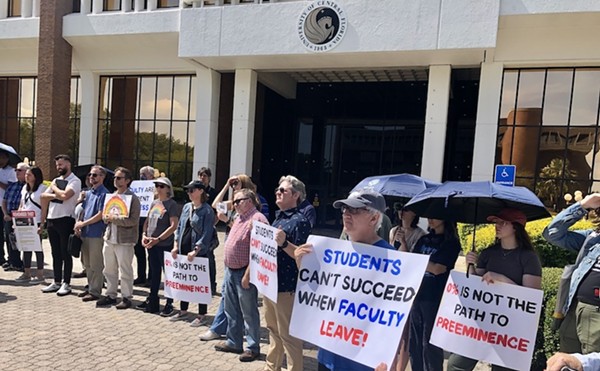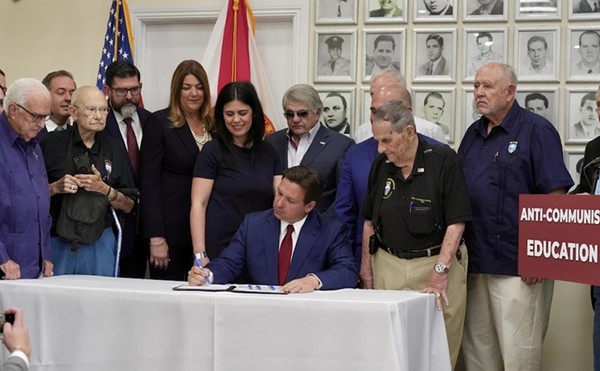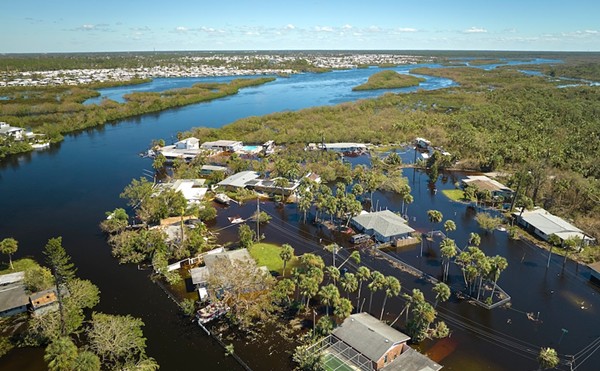On Feb. 26, at least a million Floridians had their lights knocked out. A fire at a Florida Power & Light substation near Miami caused four plants – two nuclear reactors and two coal-burning plants at Turkey Point on Biscayne Bay – to shut down, setting off a chain reaction in Florida's electrical grid. It righted itself quickly, but the outage was enough to make many nervous.
;Reporters called the Department of Homeland Security, which gave assurances that the blackouts were not an act of terrorism. The Nuclear Regulatory Commission insisted there were no immediate safety issues. The mayor of Miami-Dade County allayed fears to the Associated Press, calling the outages technical and not criminal. "It's a matter of just cascading effect," he told them.
;As it turns out, there wasn't even a fire. An engineer repairing a malfunctioning switch had disabled two levels of protection to get at it. When a circuit shorted out, creating smoke, the systems that would typically absorb the impact weren't in place, causing the event to be reported as a fire. Then the rolling blackout began.
;It wasn't just any blackout; it conjured fears not unlike those that sent Cold War kids into fetal positions under their homeroom desks. The words "nuclear" and "human error" in such close proximity had the makings of an anxiety attack.
;The subject of human error is common in the nuclear energy debate, a discussion that's been resuscitated recently in the interest of combating climate change. Florida is home to five nuclear reactors, ranking the state 12th nationally when it comes to generating capacity. But nuclear power plant disasters at Three Mile Island in Pennsylvania in 1979 and Chernobyl in the Ukraine in 1986 created a stigma that has kept new reactors from even being considered here and everywhere else in the United States.
;That could be all about to change.
;Millions of dollars in federal subsidies for nuclear power signal a return to favored status for the technology. The new spin on this old way to generate power is that it is both green and renewable, and can accommodate increased demands for energy far into the future. Utility companies are already gearing up for the new nuclear power assault, as are legislators and lobbyists. If you haven't heard the spiel yet, you soon will.
THE FUTURE
;Florida's five nuclear reactors are at Turkey Point, in St. Lucie County and on Florida's west coast at Crystal River. There hasn't been a nuclear plant built in the state since 1983. Between 1975 and 1998, Florida's nuclear kilowattage nearly quadrupled to just over 30 million kilowatt hours, but has since stabilized. Currently, nuclear energy accounts for about 15 percent of the state's power, with coal and natural gas splitting most of the difference.
By 2050, Central Florida's population is expected to more than double, from 3.5 million to 7.2 million. Progress Energy Florida media spokesman C.J. Drake projects that Central Florida's energy needs will jump 25 percent over the next 10 years. In the past 25 years, Progress has added 600,000 customers, with 25,000 coming just last year. And seeing as Gov. Charlie Crist has expressed no interest in moving forward with coal, Drake says that of the three available options for supplying base load (the minimum level of energy required over a 24-hour period) – coal, natural gas and nuclear – nuclear is the best choice. Natural gas ties us to foreign oil, he says, while solar and hydropower (the harnessing of moving water) aren't continuous enough. Nuclear power – with its limited carbon footprint – is the only logical choice, he says.
;"Even with all the efficiency measures and renewable energy in the forecast, we're still going to need base load," he says. "Energy efficiency – as robust and dynamic as it is – it can't take the place of base load."
;This month, Progress is moving forward with plans to erect two new "state-of-the-art" Westinghouse AP-1000 reactors in Levy County south of its Crystal River plant. On March 11, they filed a petition for need with the Florida Public Service Commission and hope to have the reactors operational in 2016 and 2017, respectively.
;Progress will be watching closely to see how things unfold for Florida Power & Light. Their petition process is already well underway for two new reactors to be built adjacent to their Turkey Point plant; on March 10, the PSC staff recommended that they move forward, with a final vote due very soon. The reactors already won zoning approval from the Miami-Dade County Commission.
;"Some of the things the [Public Service Commission] must consider during the need determination process are whether a proposed nuclear plant will provide needed baseload capacity, improve fuel diversity, and contribute to the long-term stability and reliability of the electric grid," writes Todd Brown from the PSC Office of Public Information in an e-mail. "Cost effectiveness will also be addressed in the context of such objectives."
;FPL's projected costs of $5,800 to $8,000 per kilowatt hour considerably exceed industry estimates for nuclear, which top out at $6,000 per kilowatt hour.
;Further up the grid, the Orlando Utilities Commission petitioned the PSC in to December to ensure its place in the process.
;"FPL is required by statute and Commission rule to hold discussions with other electric utilities, and to include in its petition a summary of those discussions regarding the other electric utilities' ownership interest in the proposed nuclear plants," the petition reads. "OUC is a public agency electric utility, in need of nuclear base load generation resources. OUC has been actively seeking minority ownership interest in nuclear base load facilities throughout Florida, specifically the proposed FPL nuclear plants subject to the Commission's determination in this proceeding."
;OUC already has a 6 percent ownership stake in the St. Lucie County plant, pulling about 51 megawatts from it off the grid, while its 1.6 percent stake in Crystal River brings about 13 megawatts. But nuclear makes up only a small portion of Orlando's power; the majority comes from coal, with some natural gas.
;OUC spokesman Sheridan Becht calls the relationship with other power companies "mutually beneficial," but is quick to point out that Orlando is trying to push ahead with other alternative energy measures and efforts at overall efficiency. They've recently launched a new solar energy initiative, one that will include solar panels atop their new headquarters.
;"It's kind of a demonstration to show that that's a viable option," Becht says. "It's not obviously going to be enough to run the building but it's going to show that we're working to develop that technology, or to help it be more widespread."
;There will be no nuclear reactor near Orlando, he says -– they're too expensive and Orlando is too small – although the technology may be important in the city's future.
;"Certainly there's a so-called resurgence in nuclear energy because of the climate-change issues, because it doesn't have carbon emissions," he says. "For that reason, people are taking a new look at it."
; One of those people is State Sen. Lee Constantine of Altamonte Springs. Constantine –
; who successfully sponsored Senate Bill 890 in 2006, limiting the control of local government over the siting of reactors and eliminating a competitive bid process to get them built – was one of four U.S. legislators handpicked by the Nuclear Energy Institute, a trade group of companies that own nuclear power plants in the United States, to tour reactors in France last November.
"This trip presents opportunities to observe modern nuclear and nuclear waste technologies, and to apply that knowledge to Florida's unique and growing need for energy without increasing greenhouse gas emissions," he said in a press release prior to the journey. "As a Florida Energy Commission member, obtaining first-hand knowledge about nuclear generation and disposal in a country that has allowed it to thrive and become a major benefit to its citizens will be a benefit to Florida's citizens."
;In other words, it's already happening.
;; THE PAST
; Not everyone is buying the greenwashing of nuclear power, and not everyone welcomes its return. Nelson Betancourt, for one, isn't sold.
Betancourt has been fighting a battle against nuclear power for most of his adult life. His father, Alonso Betancourt, was one the classified workers assigned to excavate – and later clean up – the Cannikin site on Amchitka Island in Alaska, where, in November 1971, the United States Atomic Energy Commission executed the largest underground nuclear explosion in this country's history. The explosion was used to test a Spartan missile warhead, and it generated a shock that registered 7.0 on the Richter Scale and created a crater one mile wide and 40 feet deep.
;On July 20, 1977, Alonso Betancourt died of pancreatic cancer, leaving his family – who had relocated to Orlando following his diagnosis – to pick up the pieces and try to figure out what happened to a husband and father about whose work they knew very little.
;"I had always been really interested in this nuclear radiation thing," says Betancourt. "You know, I've been interested in a lot of things. Part of the thing here is my father and I were very different. My father was very right-wing, and I was always progressive. In fact, I chased Nixon's car when he came into Anchorage to say how wonderful this Cannikin thing was. I had no idea my father was working at Amchitka, because it was all confidential."
;For the past eight years he's been putting together a documentary, Cannikins Wake, with the help of Brazilian director Miguel Silveira, Dr. Rosalie Bertell ("the anti-nuclear nun"), Bill Darnell of Greenpeace and Beverly Aleck. Aleck believes her husband suffered the same fate of radiation poisoning from the explosion at Cannikin.
;A teaser reel debuted at February's OLA Fest juxtaposed riveting footage of mass destruction – a surface that wasn't supposed to be breached by the explosion was destroyed – with activists from Greenpeace and Betancourt himself emotionally recounting the pain of the loss of his father.
;He sees the renewed interest in nuclear power as a harbinger of a painful history repeating itself.
;"The reason why nuclear power is so polarizing is because it's related to nuclear weapons. You can't divorce the two things," he says. "When you realize there's so much involved in the nuclear fuel that's used for reprocessing, and then you have all the mining and milling that goes beforehand, then you're not only talking about energy, you're also talking about the environment."
;"My opinion is that we need to talk about it. My opinion is that we as citizens, we can't stand idly by because maybe there's a low probability of an accident … but the risk is a disaster."
;Accidents, of course, do happen. On March 28, 1979, a partial meltdown in reactor two of the Three Mile Island nuclear plant sent plumes of radiation into the air over Dauphin County, Pa. On April 26, 1986, an explosion in reactor four of the Chernobyl Nuclear Power Plant was more destructive. Death estimates range from 50 actual deaths, by the International Atomic Energy Association and the United Nations, up to 200,000, according to Greenpeace.
;"The reality is it's not inherently safe," says Tyson Slocum, director of the Public Citizens Energy Program in Washington, D.C. "You're dealing with a nuclear reaction. All it takes is one accident and this whole proposed renaissance is going to be over. The main problem that we have is that nuclear power is so incredibly expensive and it is hogging all of the subsidies to the point where competing technologies that don't have these kinds of fatal flaws are getting pushed aside."
;The federal government is, in fact, heavily biased in favor of nuclear power. The U.S. Department of Energy is requesting $15.3 billion in its 2009 budget to devote to the care and feeding of nuclear weapons, non-proliferation, site cleanup and waste disposal; and only $4.3 billion in actual energy supply ($1.9 billion of that being nuclear). Meanwhile, spending on programs focused on energy efficiency and renewable forms of energy will be slashed by more than $467 million.
;"Could you imagine, instead of providing $18.5 billion in loan guarantees – which the appropriations bill in December 2007 has authorized for the nuclear power industry – could you imagine if the Department of Energy instead authorized $18 billion in loan guarantees for American families to install solar panels on their roof? That's not the conversation we're having," says Slocum. "Because American families do not have an army of lobbyists working on their behalf."
;Even internationally, the money is behind nuclear. Slocum notes that nuclear giants like Areva Nuclear Power Inc., France's nuclear behemoth, maintains a steady presence in the Washington, D.C. Areva has more than 6,000 employees in the United States, but is largely focused on new plants in France (where nuclear energy makes up 80 percent of the nation's power), Finland and China. In the first nine months of 2007, Areva reported $11.6 billion in revenue, nearly 7 percent over the year before. Its orders for plants jumped 30 percent in the first half of 2007, to $45 billion. In 2007, Areva spent $1.6 million lobbying the federal government.
;"The American public does not know that a nuclear power company cannot build a reactor without massive subsidies," he says. "If you think it's difficult to get insurance for the 16-year-old driver in your home, imagine trying to get insurance for an owner of a nuclear power plant. It's just not going to happen. Their capital costs are prohibitively high."
;They also don't know that all of the high-paying new jobs promised by these projects will probably go to experts from other countries.
;"Who in Florida can put on their résumé that they worked on an engineering or construction crew working on a nuclear power plant in the last 30 years?" he says. "You're not going to get anybody. Do you know who's going to be filling the best construction jobs for these? French nationals and Japanese nationals."
;Meanwhile, he thinks that the environmentalists may have stopped short on the issue.
;"They did a great job in warning the country and the world about climate change and the problems with burning fossil fuel, and made that the No. 1 issue, and nuclear power just kind of snuck in," he says. "The issue here is that you're looking at an environmental catastrophe that could be potentially be worse."
;The political situation isn't much better in Florida. According to State Rep. Scott Randolph, the utilities carry more power than the insurance companies in Tallahassee, and a nuclear resurgence is a foregone conclusion.
;"The typical utility message is we have to produce more and more energy," he says. "I think the way we regulate utilities, of course they're going to tell you that and of course they're going to go with the idea that we've just got to produce more and more. That's how they make their money."
;Randolph says that Florida's rate-payer impact measurement structure – a system that measures the value of energy sources by the effect on customer's rates – heavily favors utilities and discourages renewable alternatives. He's just filed a bill to force the PSC to change its regulatory structure of utilities and consider energy efficiency. He's not for more nuclear power plants.
;"It's a shame. The subsidies are going there," he says. "And it's interesting to note that you could not build them without government subsidies. The private market won't back the bonds, won't back the financing to build a new plant."
;"I've actually always loved the Republican side, which is ‘free market, free market, free market – give me a billion dollars!'" he adds. "If you think that the market will tell us what we should do, well then, the market's telling you that we shouldn't be building nukes."
;There are other reasons than the fickle sways of bank ledgers, though. Nuclear reactors are prime terrorist targets, and given the United States' policy on its international adversaries engaging in nuclear energy programs – something it vehemently discourages – this renewed interest domestically may come off as duplicitous.
;Julie Aires, a spokeswoman for Florida's Green Party, suggests that America may be talking out of both sides of its mouth on the nuclear issue.
;"I don't think that this country, without being hypocritical, can dictate to other countries that they can't at least pursue nuclear power as long as we're doing it, and nuclear bombs as long as we're doing it."
;But she acknowledges that there is something in the air that hints of a radioactive future.
;"I do think it is seemingly moving more in the direction of trying to soften us up to accept nuclear power," she says. "It's definitely going to be a mighty struggle to prevent it."
;Betancourt's doing his part with the documentary, hoping that some candid conversation about energy will get people thinking about the reality of nuclear energy.
;"The timeline, we're talking about tens of thousands of years," he says. "There's an element we're adding that you don't know what could happen. How do we know where the population is going to live, what the environment's going to be like?"
;He's quietly trying to revive the debate, even if nobody's listening.
;"My father died of nuclear radiation exposure and I will work until my dying day to expose the lies and myths of the nuclear industry and to abolish nuclear weapons from the face of the earth," he reads aloud from an unpublished letter that he sent to the Orlando Sentinel.
;"I think that was a little too strong for them," he laughs.
; [email protected]



















